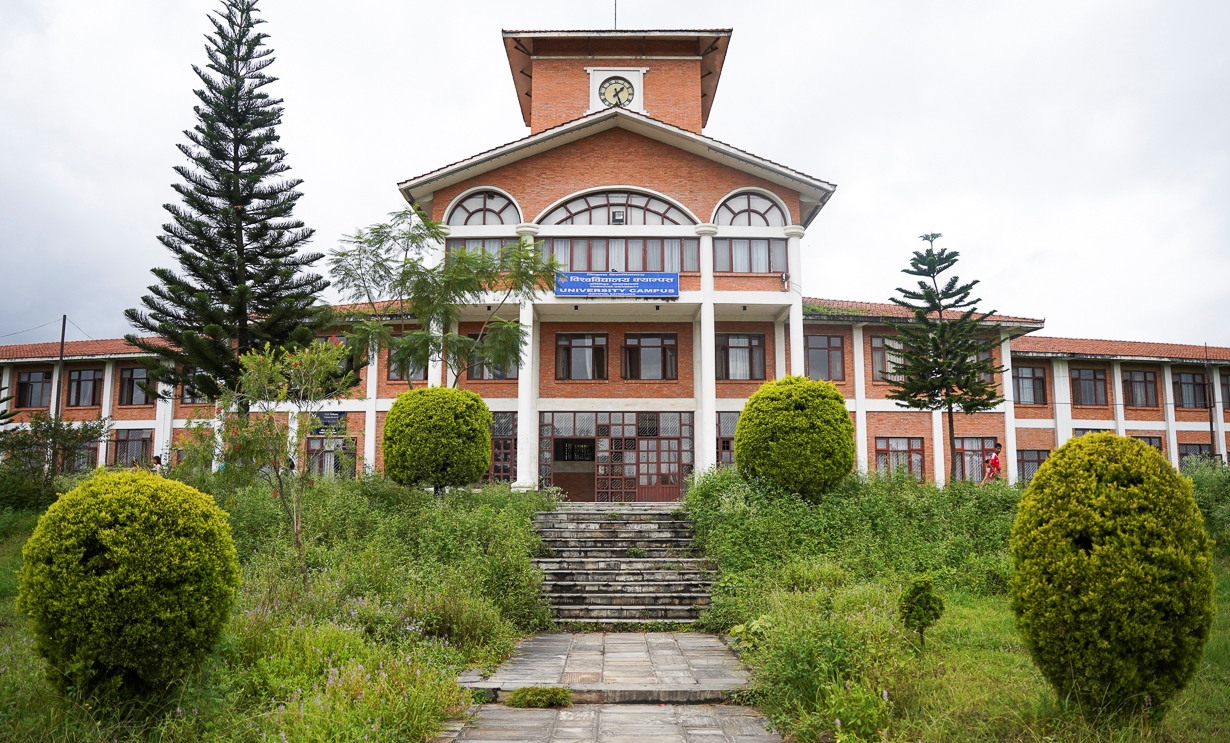Nepal’s judicial system jails innocent people, that too intentionally. The following are the stories of Bisa Ram Chaudhary, Ram Naresh Chaudhary and Nural Ali Jaga who spent three years behind bars for a crime they did not commit.
JB Pun Magar: Centre for Investigative Journalism-Nepal
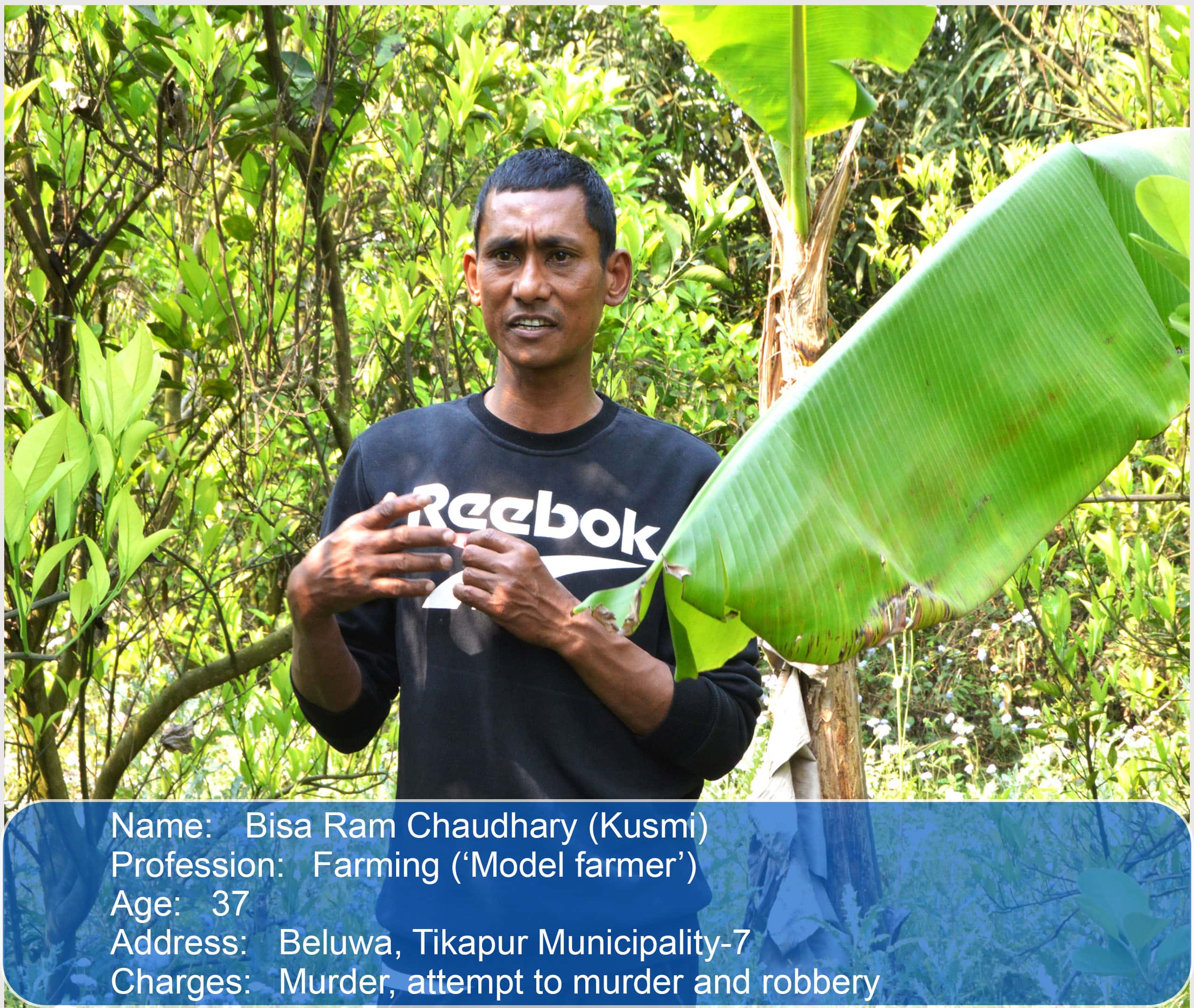
Until 2015, the government recognised Bisa Ram Chaudhary as an excellent farmer from the far-western region. His success story used to be published in national and international forums. Media outlets dubbed him an ‘agriculture revolutionary’. He was invited to training sessions across the country as a resource person.
In 2009, the Directorate of Agricultural Extension under the Ministry of Agricultural Development recognized Bisa Ram’s Siddhartha Banana Crop Development Farmers’ Group as the ‘best farmers’ group’ in the region and provided it Rs 5,000. The group’s annual transaction exceeded Rs 5 million that year. After three years, Bisa Ram was one of the 22 Nepali farmers sent to Israel for a month-long training on modern agriculture systems.
But, his fortune was reversed. On the morning of April 5, 2016, while he worked at his nursery, police arrested Bisa Ram. He was handed a warrant that mentioned he was being investigated under charges of robbery, attempt to murder and murder.
He learned the real reason behind his arrest only after reaching the police station. He was arrested for his alleged involvement in the Tikapur carnage, which saw eight security personnel and a child massacred, and policemen robbed of their arms on August 24, 2015. All this had happened eight km away from his house.
In his statement, Bisa Ram said he had not left his home on August 24. But, police officials were not convinced. They filed a case against him at the district court, which remanded him in judicial custody.
After spending three years at Kailali District Police Office, Bisa Ram was acquitted by the court on March 6 this year. He was released the same day.
He reiterated his statement to this reporter on March 29, 2019. “I was working at the nursery throughout the day on August 24. How could I go to the riot?” he said. He said he had told police, “You can ask my neighbours. They are witnesses.” But, police did not listen to him.
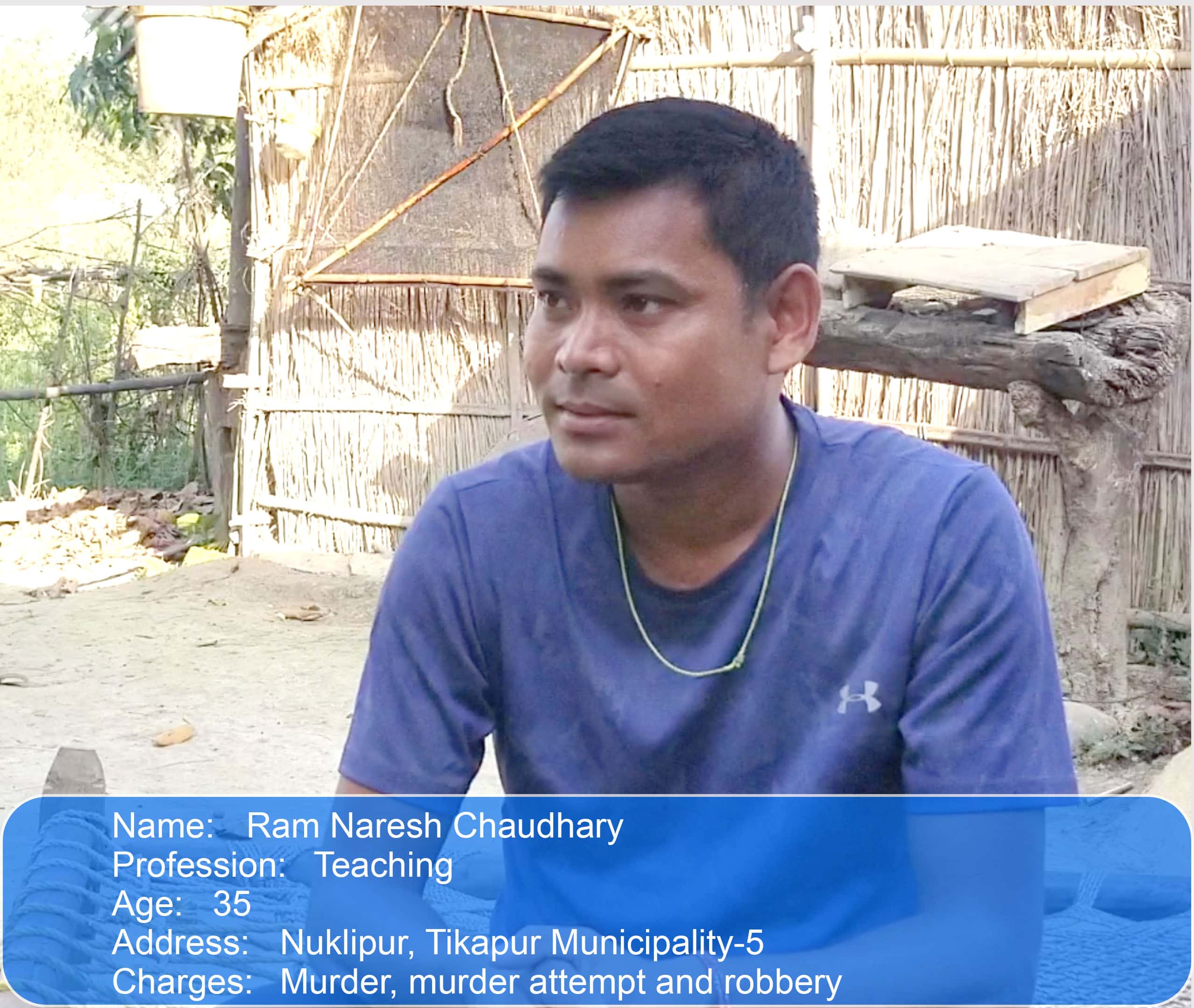 On August 31, 2015, Ram Naresh was teaching mathematics to Grade 10 students at Nawa Pratibha Boarding School in Rajapur of Bardiya district. A full-time teacher of Kalika Secondary School in Chanaura of Rajapur, Ram Naresh would take a few classes at Nawa Pratibha School in the morning.
On August 31, 2015, Ram Naresh was teaching mathematics to Grade 10 students at Nawa Pratibha Boarding School in Rajapur of Bardiya district. A full-time teacher of Kalika Secondary School in Chanaura of Rajapur, Ram Naresh would take a few classes at Nawa Pratibha School in the morning.
It was just 7 am. Two strangers entered the school premises. They whispered with an assistant for a few seconds before approaching the classroom. Ram Naresh recalls, “One of them said they were there to sell a practice book and hence they needed to talk to me. I told him we did not need any practice book. But soon they changed their tone and threatened me. They said, “you are arrested” and squeezed me between them on a motorbike.”
Six to seven uniformed policemen were waiting for Ram Naresh on the border between Nangapur and Chakkhapur, four km north of the school. They received Ram Naresh, shoved him into a van and drove him to Tikapur Area Police Post, around 11 km away. After around half an hour, he was transferred to Lamki Area Police Post, close to the East-west Highway, around 14 km away. From Lamki, he was transferred to Sukhkhad; then again to the District Police Office in Dhangadhi. By then, it was already midnight in Dhangadhi.
Ram Naresh can never forget the 100 km journey from Rajapur to Dhangadhi. Recalling the incident after three years, in Satti village of Tikapur, on April 1, 2019, he said, “Security personnel beat me inside the van, saying, wasn’t it you who attacked us with a spear last week? I told them I was teaching at school. But, they thrashed me with their helmets.” At Sukhkha station, drunken policemen took turns to kick him and hit him with batons.
“It was a nightmare,” he said.
On the day of the Tikapur carnage, Ram Naresh was teaching at Kalika Secondary School. His house is 15 km away from the school; that was why he’d rented a room near the school. The school’s attendance record and statements by the school principal and students prove that Ram Naresh was in the school. After Ram Naresh pleaded not guilty, Suklipur Police Post chief Krishna Bahadur Bohora checked the attendance record.
Notwithstanding this, he was kept in custody of the District Police Office for 43 days in the name of investigation. After the government attorney filed a charge sheet, he spent three years, six months and eight days in judicial custody. On March 16, he was released along with Bisa Ram.
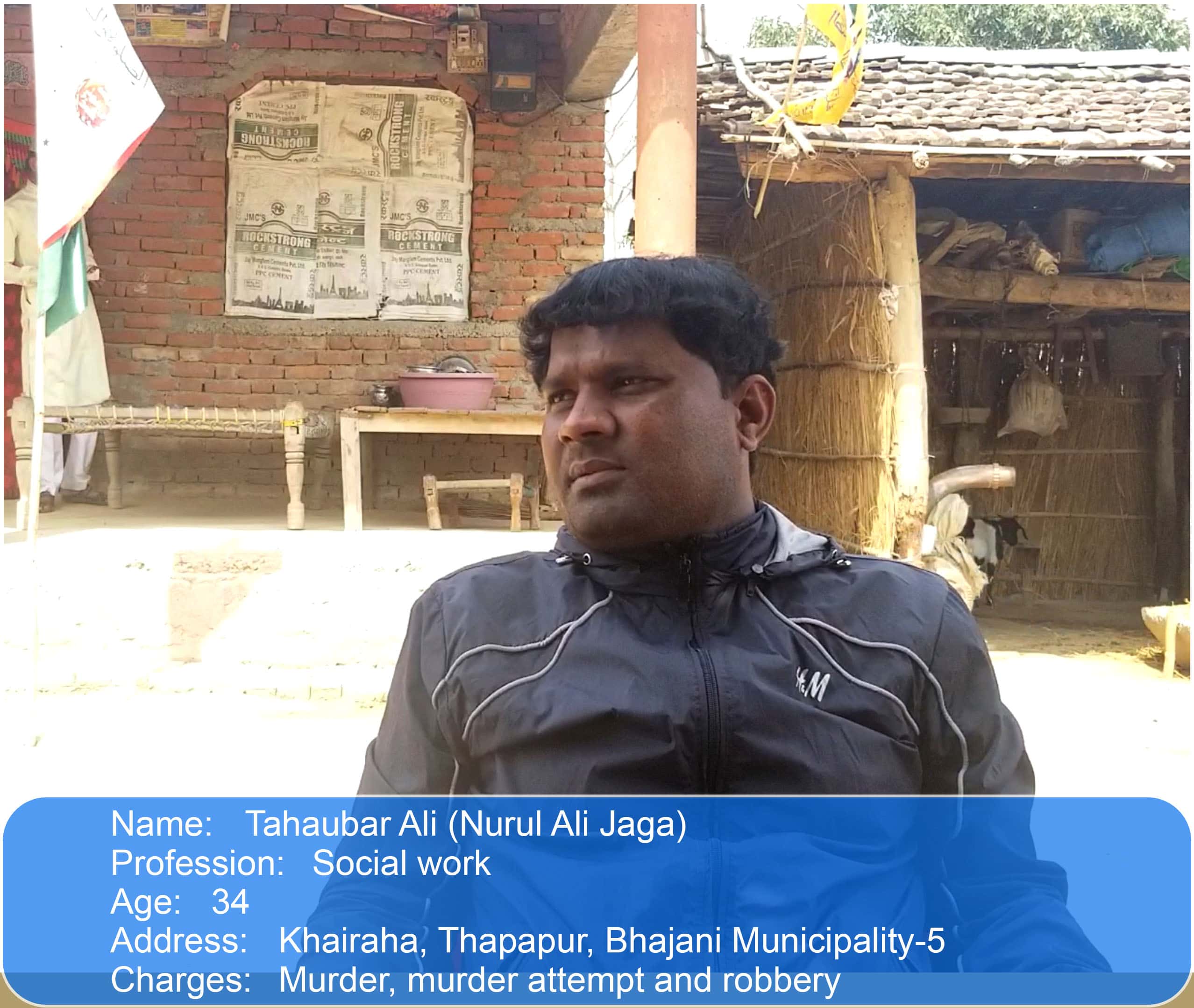
On the day of Tikapur carnage, the chairman of Madin Tunur Moharummul Ulum Madarsa Primary School Management Committee, Nurul Ali was caught up in a dispute in his village. After Mohammad Jaga (23) from the Muslim settlement of the village destroyed some paddy plants while collecting fodder for his cattle, he had a fracas with Kedar Dagaura (24) of another settlement. After Kedar said he lost a golden locket during the scuffle, local leaders organised a meeting to resolve the dispute.
On August 24, 2015, the Tharuwan/Tharuhat Struggle Committee told its community leaders to make sure that at least one person from each household took part in the protest. On the day, protesters planned to put up the ‘Tharuwan Autonomous State’ signboard at government offices based in Tikapur, where the local administration had banned protests.
Khairaha’s community leader Chandra Lal Dagaura directed members of his community to join the protest. But, owing to the meeting convened to resolve the dispute, Chandra Lal along with her fellow villagers could not make it to the protest.
“Farmers of 70 households in Khairaha Uttartole were busy on August 24 and 25,” Chandra Lal remembers, “After police arrested Jaga on murder charge, I went to the station and gave my statement.” His neighbours Indra Kumar Mallah, Mustak Ali and Rais Ali also went to court to give their statements in favour of Jaga.
But, the court remanded him in judicial custody, where he spent three years and six months. He was acquitted on March 6 and released.
Fake statements
After the March 6 verdict, we talked to people acquitted in the Tikapur case, their family members, those put on the fugitive list and other locals. We also studied reports of police investigation, the government attorney’s charge sheets and court verdicts. We went through related laws.
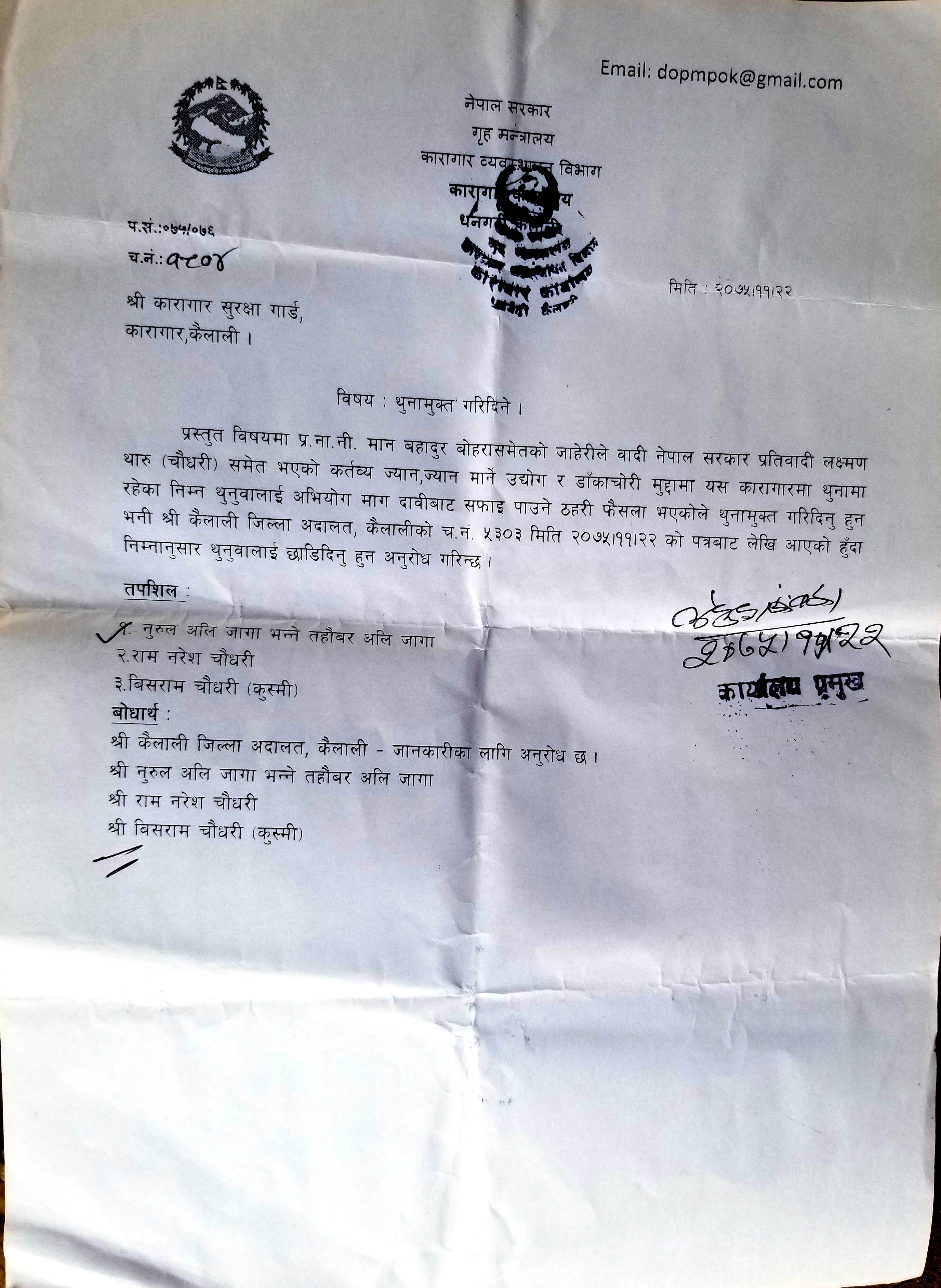 Our investigation proved that innocent persons were jailed intentionally by the criminal judicial system; and police hand-picked people, arrested them and forced them to sign confessions.
Our investigation proved that innocent persons were jailed intentionally by the criminal judicial system; and police hand-picked people, arrested them and forced them to sign confessions.
A statement reportedly signed by Ram Naresh on September 7, 2015 is a case in point. An extract from the statement reads, “We forced the SSP, who was hiding in a neighbour’s house, to come out and attacked him with a spear. We chased other police staff and killed them, using our weapons.”
The document submitted by police mentions that Ram Naresh accepted that he and 11 others attacked police. Other members of the gang were been identified as Sita Ram Chaudhary, Phiru Lal Chaudhary, Bisa Ram Chaudhary, Phul Ram Chaudhary, Bal Krishna Chaudhary, Shiva Kumar Chaudhary, Chaman Chaudhary, Shrawan Chaudhary, Karan Chaudhary, Pradeep Chaudhary and Hari Narayan Chaudhary.
The District Court sentenced Karan (14) to six months in jail because he was still a minor whereas 16-year-old Shrawan was handed a life sentence because he was also a minor as per Section 11(3) of the Children’s Act 1991. He could be jailed for 10 years only. Based on the statement of Ram Naresh, the court also handed life sentence to Hari Narayan and Pradeep whereas Bisa Ram was sent to jail for three and half years. Others were listed as fugitives.
“But, I don’t know any of them,” Ram Naresh says, “I saw them in the jail for the first time.” So how did police produce this statement? “An official at the District Police Office transcribed my statement and told me to sign. I asked if I could read it once before signing. But, he immediately hit me on the head with a plastic chair,” said Ram Naresh.
He remembers the policeman saying, “You already did many wrongs, now there’s no use of reading it.”
While the Ram Naresh’s statement claims that he attacked police with support from Shrawan and Pradeep, both of whom he did not know back then, according to the statements by these two ‘accomplices’, Bisa Ram was with them. Bisa Ram recently received a clean chit from the court.
“I was alone in my banana farm. I didn’t have time to go elsewhere. I learned about the incident from a TV news bulletin that evening,” Bisa Ram told the court, “I don’t know why Shrawan and Pradeep named me. I don’t know them.”
In the meantime, police forced a seventh grader of nearby Moti Secondary School, Karan Chaudhary to state that those arrested were directly involved in the killing of eight security personnel and a child. It has been revealed that police made Karan mug up a long list of suspects and identify them. (Read: ‘They made me mug up 32 names’)
After the incident, police listed 58 suspects. Of them, 27 were arrested and 31 were put on the fugitive list. Lawmaker Resham Chaudhary among 11 persons have been convicted of the crime and handed down life imprisonment recently.
What’s the use of a clean chit now?
The district court acquitted Bisa Ram, Ram Naresh and Nirul. But, it was already too late–for many things happened in their life in three years.
When he came back, Bisa Ram was welcomed by his wife, six-year-old daughter and kin; but his nursery and agrovet shop were in the lurch.
His wife suffered a lot in these three years. In his absence, she worked at the agrovet, but could not take care of the nursery. Consequently, many plants could not make it whereas the banana harvest was stolen.
In his absence, the banana farm, established with a loan, turned bankrupt. “I have to pay back Rs 4.7 million. Besides, the interest payable to the Agricultural Development Bank is Rs 1.5 million,” a hopeless Bisa Ram sighs, “I am yet to calculate the amount I have to pay for the miscellaneous goods I brought.”
Until three years ago, Bisa Ram had never crossed a deadline to repay installments to the bank. The bank had recognised him as a ‘good debtor’. But, the same institution recently warned him of auctioning off the land after his failure to pay back its loan.
Ram Naresh was the sole breadwinner for his five-member family. He had built a small hut for the family after toiling in two schools for 10 years. After he was jailed, there was no one to plough his small plot of land. The wife worked as a porter and farm worker to support her eight-year-old son, father-in-law (55) and grandfather-in-law (90) meet. As she could not give him much time, her son could not perform well in school.
When he returned home after three-and-a-half years in March, Ram Naresh cried seeing the family.
Nepal Rastriya Secondary School in Rajapur Budhiyana of Bardiya district recently signed an employment contract with him. “I hope the messy economic condition improves in a few years,” he says, “But, how long will it take me to get rid of the ‘murderer’ tag?”
Nirul’s family is poorer than that of the other two men released recently. Because his is a joint family, his four brothers supported his wife and three children in his absence. But, the children dropped out the school for want of money. “The brothers gave them food and shelter, but not the school fees,” he says, “Though late, the court gave us justice. If the government gave some compensation, we could send the kids back to school.”
Doesn’t this incident suggest problems with Nepal’s criminal judicial system? “A case is forwarded to the court on the basis of circumstances of the incident, collected evidence and statements of the arrested suspects,” Nepal Police spokesperson DIG Bishwa Raj Pokharel says, “Some suspects change their statements in court.”
“In the offences that demand a three-year sentence, sometimes the court releases the suspects after one year. Generally, those sent to judicial custody rarely get clean chits. If five persons are sent to judicial custody, at least three get convicted,” he says.
But, shouldn’t they get compensated after being proved innocent? “Some other countries have such practices, but it is not natural and easy for us here,” Pokharel says, “The time is not ripe yet to do so. First, our investigation system needs big investment. The state has to be capable.”
Witnesses turned into criminals
Of the 27 persons arrested on the charges of murder, murder attempt and robbery during the Tikapur carnage, the Kailali District Court convicted 13 persons as per Section 17(3) of Muluki Ain. The clause states that if anyone witnesses a murder, and does nothing about it, he/she will be jailed for six months to three years.
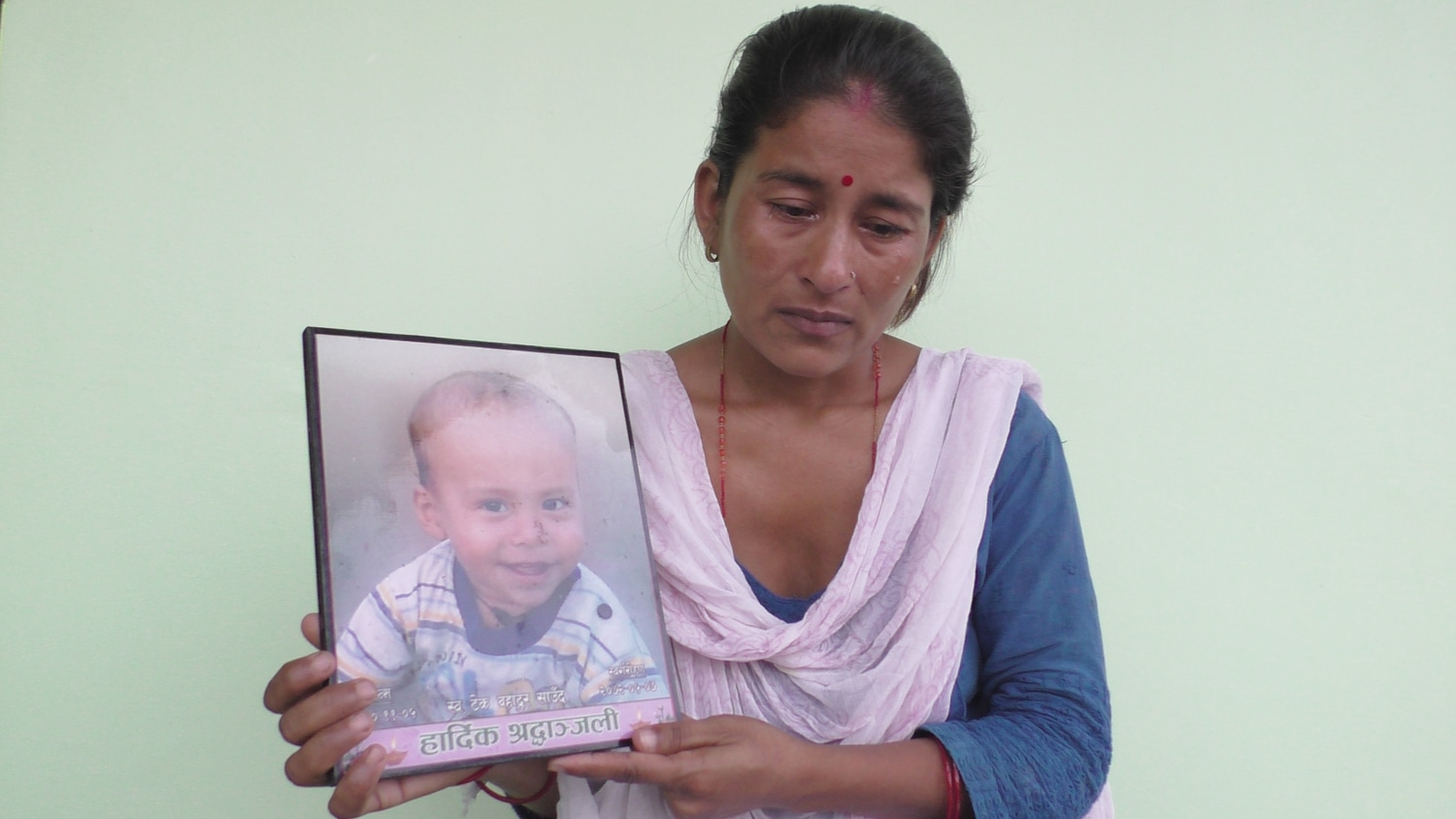
Yasoda Saud lost her son who was a year and half old toddler in Tikapur indicent. Photo courtesy: Krishna Adhikari
But among the 13, only one minor Karan Chaudhary was the real witness. Police know that Kailali district coordinator of Tharuhat/Tharuwan Struggle Committee, Lahu Ram Chaudhary was addressing a mass meeting in Pashchim Dhangadhi, 100 km away from the site, during the clash. But, he also spent three years and six months in jail under the same clause.
They also know that Tharuhat leader Laxman Chaudhary was on his way to Gulariya. Call details from his mobile phone back up this claim. Gulariya is 65 km east of Tikapur. But, a statement by a witness says he was at the scene. He fatally attacked police personnel, according to the statement. But in reality he was charged for his ‘aggressive’ Facebook status.
A pharmacy owner in Bhajani Bazaar, 25 km southwest of Tikapur, Prem Bahadur Chaudhary was also arrested. Prem Bahadur’s sick goat had died that day and the neighbours had distributed its meat among themselves. But, police accused him of hosting a feast to celebrate the murder of policemen.
Local Batasiya Dagaura visited Prem Bahadur’s pharmacy with her son Gokarna that day. She says, “The doctor [Locals call him ‘doctor’] was here from dusk to dawn.” Prem Bahadur’s eardrums were damaged by the police due to torture in custody.
The Tripura Sundari Lower Secondary School in Thapapur was shut due to the protests. Therefore, teacher Santa Ram Chaudhary was in his shop. He received a call from his son Prabhat, a boarding student at Ganesh Baba Secondary School in Tikapur, who asked him to come fetch him as his school was also closed. Santa Ram borrowed his neighbour Kisan Lal’s motorbike and headed to Tikapur. But, he saw a crowd on the way and returned to the shop.
“He was at the shop till the evening. I was with him,” local Hari Ram Acharya (50) says. “After he was framed for the crime he did not commit, I also went to Dhangadhi and told the truth. But they did not listen to me.” Santa Ram says, “We got blamed for nothing. It feels I am held hostage at own home today also.” He suspects he was arrested because he had emceed a function during the Tharuhat movement.
The story of Sita Ram Chaudhary ‘Bidroha’ is an extreme example of negligent investigation. Sitaram (35), whose real name is Santa Kumar, is the son of Phool Ram Dagaura of Kailali Thapapur-7, Nawalpur. According to police, the former Maoist rebel is one of the fugitives in the Tikapur case. But Chaudhary has been serving a life sentence as ‘Sita Ram Chaudhary’.
‘They made me mug up 32 names’
Karan Chaudhary has been presented as a primary witness in the incident. The 14-year-old was returning home from a tuition class with his friends when he heard gun shots during the clash. People dispersed after the firing and Karan could not find his friends in the crowd. Alone, he watched what happened from the roadside. He saw police chase protestors first and the protestors retaliate. They attacked police with home-made weapons.
Later, police in civvies arrested him and accused him of killing the policemen and robbing their arms. He was taken to the District Police Office and made to mug up 32 names of people police wanted arrested.
“They showed me the list and asked if I knew anyone. I had not, I said them no,” the teen recalled in a conversation with this reporter on April 4, 2019, “They said I had to remember all the names in two days anyhow and tell the court that they killed the cops. I couldn’t disobey them.”
As per the court record, he said, “I saw defendant Pradeep Chaudhary snatch a gun from police and hand it over to Shrawan Chaudhary. Shrawan took away the arm. Another defendant Raja Ram Chaudhary shot video of the crime on his mobile phone… After killing the police, Resham Lal Chaudhary and some persons, whom I don’t know, lifted me up on their shoulders and cheered ‘congratulations, brother’.”
“I did not know anyone. But, police used to take me to the big hall of the District Police Office and tell me everyone’s name,” the 17-year-old says.
Following the verdict by Kailali District Court, Karan was sent to a juvenile centre in Sarankot, Pokhara. His family has already left Kailali due to security reasons.


